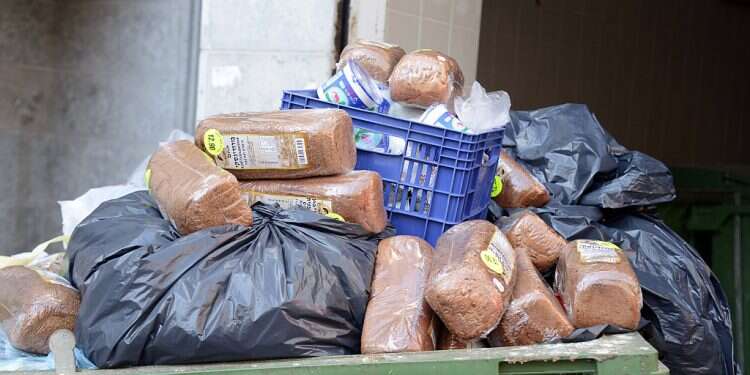Nearly 2.5 million tons of food waste was thrown away in Israel in 2020, amounting to 19.1 billion shekels ($6 billion), according to a report published this week by the Environmental Protection Ministry and Leket Israel, the country's leading food rescue organization.
Follow Israel Hayom on Facebook and Twitter
According to the food bank's sixth annual Food Waste and Rescue Report, the number amounts to almost NIS 3,600 ($1,140) per household and represents 35% of the food produced in the country. Half of it – 1.1 ton worth NIS 6.4 billion ($2 billion) – was thrown away when it was still edible and salable.
Just under one in five (18.7%) Israeli households reportedly suffered from food insecurity last year, Leket Israel said.
The food bank found that the coronavirus pandemic did not significantly alter food waste habits compared to 2019, but changed the way the waste was distributed. As more people spent time at home due to lockdowns, food waste increased by NIS 800 million ($255 million) compared to 2019.
The report takes a stand against the previous government's decision to give stipends to the entire population during periods of confinement, saying it would have been wiser to focus financial assistance on those in greatest difficulty.
"It would have been much more economically efficient to fund food distribution programs rather than leaving needy families to struggle on a daily basis," the report said. "The worsening problem of food waste and insecurity has only accelerated since the start of the pandemic, stressing the need to include halving waste reduction as a national cause, by the end of the decade."
Leket Israel President Gidi Kroch called on Prime Minister Naftali Bennett to implement an inter-ministerial food rescue plan.
"The findings of the Food Waste and Rescue Report illustrate the dire consequences and effects of the coronavirus pandemic on the social and economic aspects and emphasize the urgent need for action and recognition by the state on food rescue, which can provide a complete response to millions of people already suffering from food insecurity and the tens of thousands of people who joined them due to the coronavirus," Kroch said.
"The great advantage of rescuing food is the ability not only to close the entire food insecurity gap in Israel by a quarter of the budget but also higher utilization of resources and waste prevention. Additionally, food rescue helps reduce emissions and pollutants and strengthens the fight against the global climate crisis. Therefore, as recommended in the policy chapter of the report, the Prime Minister's Office should lead and promote the preparation of an inter-ministerial plan to advance the field of food rescue in a way that will holistically reflect the many benefits of food rescue."
i24NEWS contributed to this report.
Subscribe to Israel Hayom's daily newsletter and never miss our top stories!




